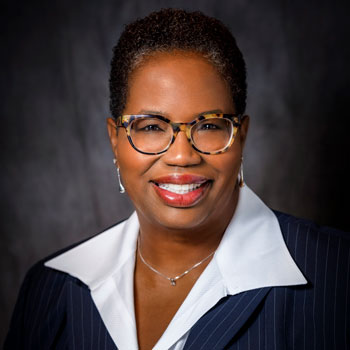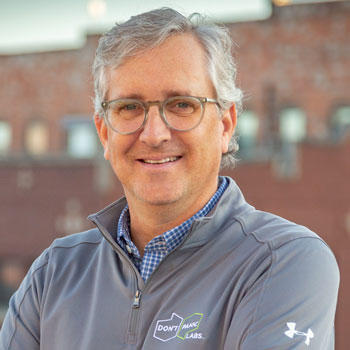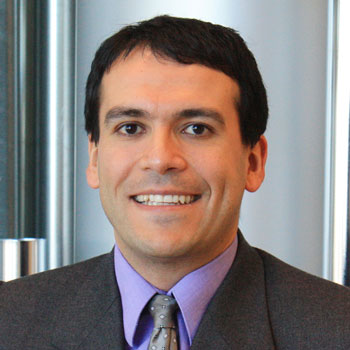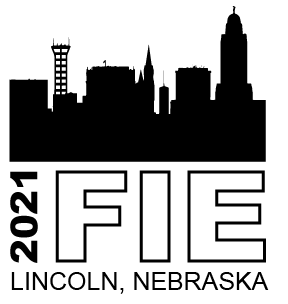Schedule for Featured Speakers
Thursday, Oct. 14 – Lunch: Dr. Stephanie Adams
Friday, Oct. 15 – Lunch: Doug Durham, Andres Torres

STEPHANIE ADAMS, PH.D.
Dean, Eric Jonsson School of Engineering and Computer Science at The University of Texas at Dallas
STEPHANIE ADAMS, PH.D.
Title:
“If not you, then who? If not now, when?”
Abstract:
The Role of Faculty in Redesigning Engineering Education
Stephanie G. Adams, Ph.D.
Dean, Erik Jonsson School of Engineering and Computer Science
It was over 100 years ago that the Carnegie Foundation released the report “A Study of Engineering Education” by Professor Charles R. Mann. The purpose of study was, “to examine the methods of teaching and the preparation of young men [women] for the engineering professions”. More specifically, Professor Mann was charged with reviewing the pedagogy of the prior 50 years, examine the curriculum and methods of the time, and offer suggestions on the methods for simplifying the present courses of study.
Though a century has passed since the release of Mann’s report, some might argue that little has changed in how engineers are taught both from a content and a pedagogical perspective; that there is still too much of a reliance on teaching fundamental science in the first two years of the engineering curriculum and focusing on the applications of the science to theoretical and practical engineering problems in the latter two years. Since 1918 numerous additional reports have been issued and special issues of journals curated calling for reform in engineering education. These reports have described what needs to be done to make engineering more attractive to diverse populations; to prepare students to demonstrate breadth across subject areas, while establishing content depth in one area; to reorganize and streamline our curricula making it more engaging and relevant; and to deliver content using innovative pedagogical approaches where engineering students are encouraged to consider the impact of social, cultural, economic and the political factors.
It has never been more clear that colleges/schools of engineering and computer science need to make significant changes to both content and pedagogy. As the keepers of curricula and the architects of pedagogy, these changes must be led by our faculty. It is well-documented that change occurs slowly in educational settings; a pace that lags significantly behind technological changes. Yet we as academics continuously strive to create experiences for our students to prepare them for global competition. If we are to be successful in this endeavor, we must adapt to new trends and educational approaches so that our students are armed with the necessary tools for the world they will inherit and lead and not just the one that exists today. This presentation will describe: 1) the purpose research fulfills in transforming the overall educational experience, 2) ideas for engineering faculty (tenure track and professional) to partner with researchers from other disciplines to shape our field and transform students’ educational experiences, 3) how systems thinking can be used to transform education, and finally, 4) what we, the faculty, need to do for our students to ensure they are successfully launched into a professional world that is difficult to predict today.
BIO:
Stephanie G. Adams is the fifth Dean of the Eric Jonsson School of Engineering and Computer Science at the University of Texas, Dallas and Past President of the American Society of Engineering Education. Previously, Adams served as Dean of the Frank Batten College of Engineering and Technology at Old Dominion University (2016–2019), Department Head and Professor of Engineering Education at Virginia Tech (2011–2016) and held faculty and administrative positions at Virginia Commonwealth University (2008–2011) and the University of Nebraska-Lincoln (1998–2008).
Her research interests include Broadening Participation, Faculty and Graduate Student Development, International/Global Education, Teamwork and Team Effectiveness, and Quality Control and Management. In 2003, she received the CAREER award from the Engineering Education and Centers Division of the National Science Foundation. Dr. Adams is a leader in the advancement and inclusion of all in science, technology, engineering, and mathematics (STEM) education. She has worked with several colleges and universities, government agencies and non-profit organizations on topics related to graduate education, mentoring, faculty development and diversifying STEM.
Adams is an honor graduate of North Carolina A&T State University, where she earned her B.S. in Mechanical Engineering in 1988. In 1991, she was awarded the Master of Engineering in Systems Engineering from the University of Virginia. She received her Ph.D. in Interdisciplinary Engineering from Texas A&M University in 1998, where she concentrated on Industrial Engineering and Management.

DOUG DURHAM
CEO and co-founder, Don’t Panic Labs, Lincoln, Nebraska
DOUG DURHAM
Title:
Helping students and graduates “see around corners”: Musing on what we can do to reduce errors in judgment.
Abstract:
New graduates are well-educated but often prone to errors in judgment. In this talk I will discuss our experience overcoming these challenges in new hires and recent graduates.
BIO:
Doug Durham is the co-founder and CEO of Don’t Panic Labs, a firm that helps companies innovate through the design and development of software technologies. He is also co-founder of Nebraska Global, Don’t Panic Lab’s parent company, known as a pioneer in the startup landscape in Nebraska. Durham has more than three decades of software engineering and development experience in aerospace and defense, healthcare, manufacturing, eCommerce, consumer web applications, and Internet network services. He is passionate about the process of solving problems through software and the application of sound engineering principles and patterns to these efforts. His diverse skills, education, and various leadership roles have shaped his career. Durham served as a civil engineer in the Air National Guard for 21 years, which deployed him to many strange and wonderful places around the world before he retired at the rank of Major in 2006. He is a proud Husker and has an electrical engineering degree from the University of Nebraska-Lincoln. He has taught at the UNL Raikes School of Computer Science and the College of Engineering and serves on a College of Engineering advisory board. Durham recently released his first book, co-authored with Chad Michel, titled “Lean Software Systems Engineering for Developers.”

ANDRES TORRES
Director of Engineering, Global Telecom Division, Valmont Industries, Valley, Nebraska
ANDRES TORRES
Title:
“The Modern Engineer”
Abstract:
Pending
BIO:
Andres Torres works as a Director of Engineering for the Global Telecom Division at Valmont Industries. He is responsible for all engineering and drafting activities including leading development projects and process enhancements. Torres was born and raised in Bogota, Colombia. He is a licensed Professional Civil Engineer in Nebraska. He is actively involved with the American Society of Civil Engineers (ASCE) and has held different roles, including president of the Nebraska Section and co-chair of the Younger Members Group. Torres received the ASCE’s Edmund Friedman Young Engineer Award in 2014, was one of the recipients of the Early Achiever Award by the Nebraska Alumni Association in 2016 and was honored as one of the Ten Outstanding Young Omahans in 2016. He lives in Omaha, Nebraska with his wife and two young sons.
Contact
PCO
E-mail: fie2021@unl.edu
(for practical questions about your registration)
AppInConf
E-mail: abstracts.fie2021@appinconf.com
(for questions about abstract submission)
Important dates
February 22, 2021
Extended Abstract Submission Deadline
March 8, 2021
All Acceptance Communications
May 17, 2021
Preliminary Paper, Special Session and Panel Summary Papers, and Workshop Outlines, Submission Deadline
June 7, 2021
Review deadline
June 14, 2021
Notification of Paper Revision Requirements and Final SSPCW Acceptance Communication
June 28, 2021
Revised Paper Submission (major revisions)
July 12, 2021
Review Revisions Completed
July 19, 2021
Peer Review Final Acceptance Communication
July 26, 2021
Final Camera-Ready Paper Submission & Copyright Deadline
September 20, 2021
Early Conference Registration Deadline
October 13-16, 2021
CONFERENCE
